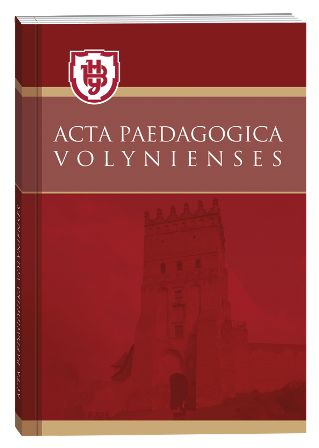PROFESSIONAL REFLECTION IN THE CONTEXT OF DESIGN COMPETENCE OF TEACHING EMPLOYEES OF INCLUSIVE RESOURCE CENTERS (ACCORDING TO THE RESULTS OF A PEDAGOGICAL EXPERIMENT)
DOI:
https://doi.org/10.32782/apv/2023.1.16Keywords:
reflection, professional reflection, project competence, pedagogical workers of the inclusive resource center, pedagogical experimentAbstract
The article presents the results of an empirical study of the level of the reflective component of the design competence of teachers of inclusive resource centers. In the absence of a professional standard for specialists of inclusive resource centers with clearly defined requirements for their competencies, the author continues analytical work on reflection as a component of competence - an important condition for the acquisition of professional knowledge and the formation of professional thinking of these teachers Designing an individual educational trajectory of students with special educational needs and an inclusive educational environment involves predicting the course and results of activities, possible changes in the Based on the results of the analysis of theoretical sources, the essence of the concepts of «reflection», «pedagogical reflection», «professional reflection», «design competence» is substantiated and the place and role of pedagogical reflection in the structure of the design competence of pedagogical workers of inclusive resource centers is determined. One hundred pedagogical staff of inclusive resource centers in Sumy, Lviv, and Zakarpattia regions took part in the study. According to the results of the methodology for diagnosing the level of reflexivity by O. Karpov, a low level of reflexivity with a tendency to average was found, according to the questionnaire «Style of Self-Regulation of Behavior» by V. Morosanova) - low levels of regulatory flexibility, that is, the ability to rebuild, make adjustments to the self-regulation system when external and internal conditions change and independence as an indicator of regulatory autonomy. At the same time, teachers demonstrated high performance in planning and evaluating results. According to the generalized results, the subjects have a low level of reflection and an average level of self-regulation.
References
Методика дослідження особливостей психологічної готовності керівників освітніх організацій до діяльності в умовах змін : Науково-виробн. розроб. / О. Бондарчук та ін. ; ред. О. Бондарчук. Київ, 2014. 148 с. URL: http://umo.edu.ua/images/content/institutes/cipo/kaf_psiholog/3_Комплекс_методик_НДР_Бондарчук_2012-2014. pdf (дата звернення: 17.05.2023).
Марусинець М. Професійна діяльність педагога: рефлексивний аспект. Психолого-педагогічні проблеми сільської школи. 2012. № 43(1). С. 39–45. URL: http://nbuv.gov.ua/UJRN/Ppps_2012_43(1)__8
Подкоритова Л.О. Значення рефлексії для професійного розвитку фахівців соціономічної сфери. Науковий вісник Херсонського державного університету: Збірник наукових праць. Серія «Психологічні науки». 2017. № 6. Т. 2. С. 71–75.







